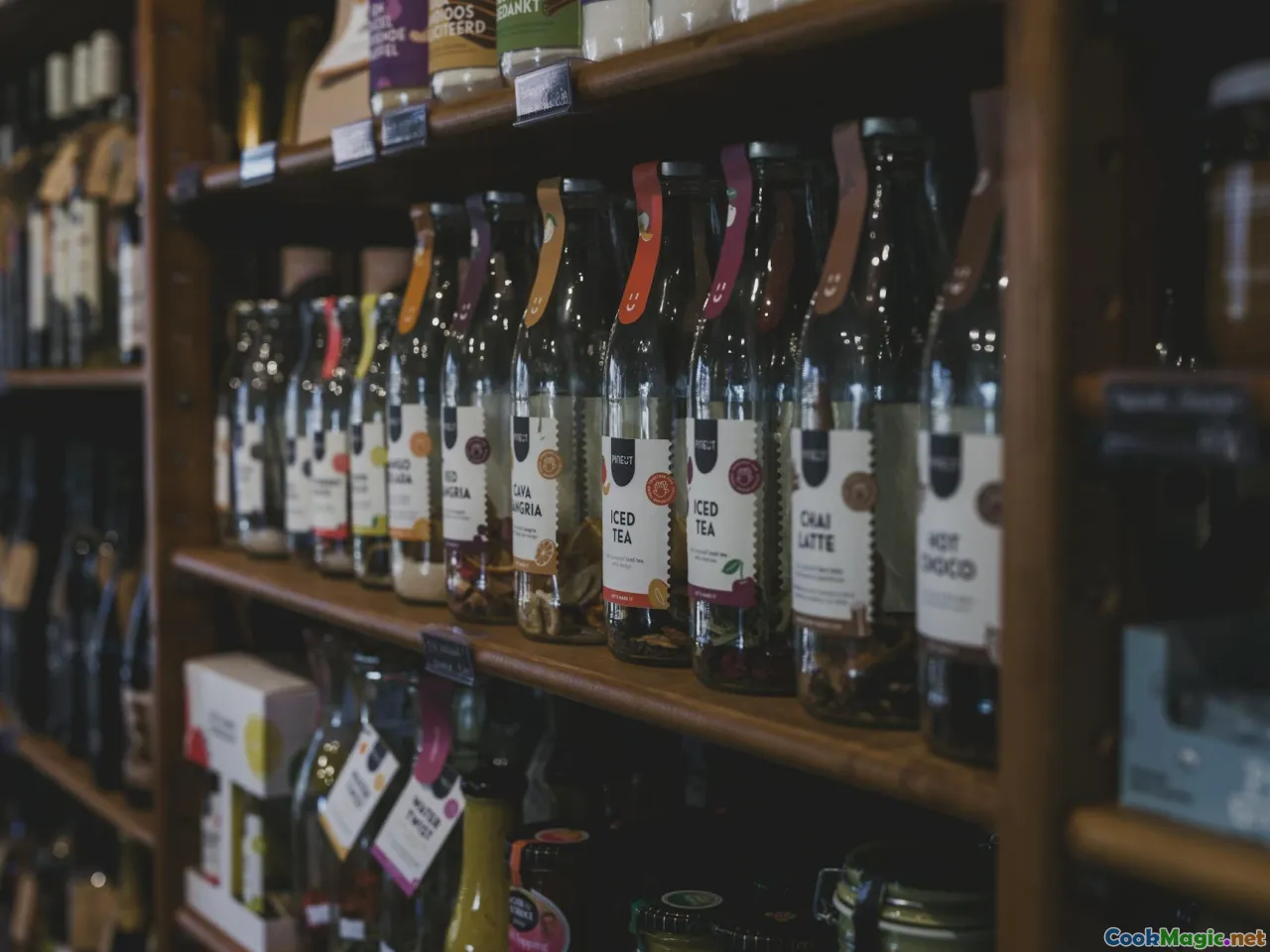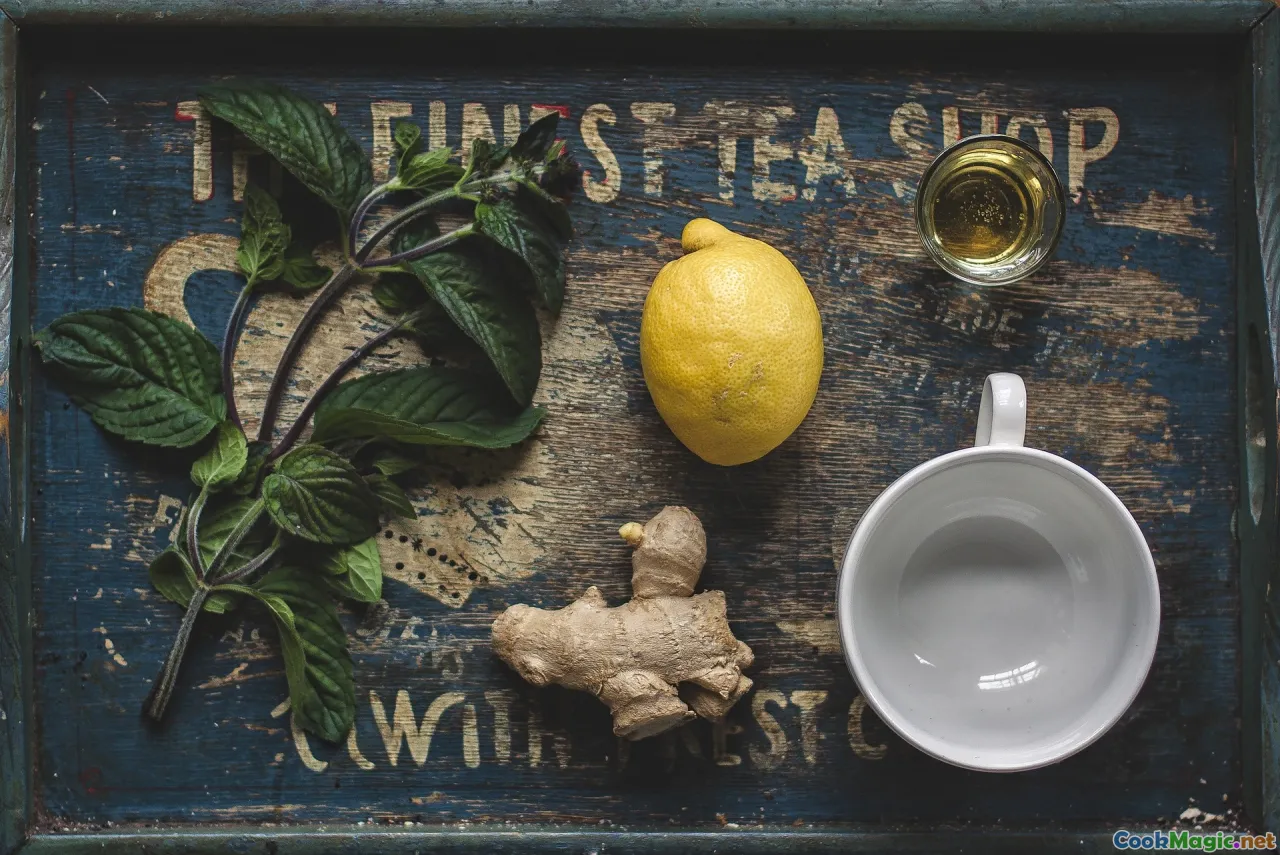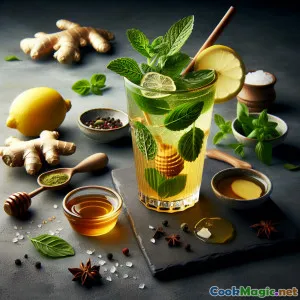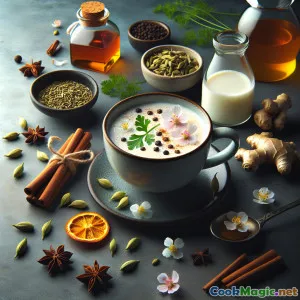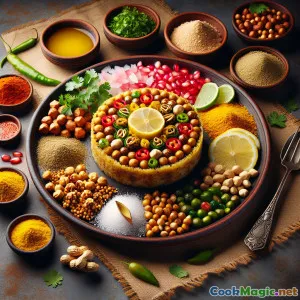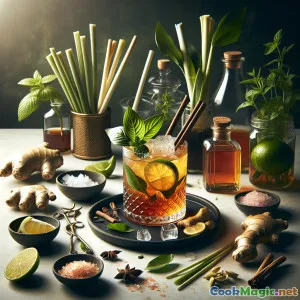
Газированный чай-охладитель леса Нилгири
(Nilgiri Forest Elixir Sparkling Tea Cooler)
(0 Обзоры)0
398
октябрь 13, 2025
Сообщить о проблеме
Ингредиенты
-
8 grams Nilgiri листья чёрного чая
(Loose-leaf preferred for floral clarity)
-
500 ml Фильтрованная вода
(Freshly drawn and cold)
-
1 stalk Лемонграсс
(Bruised to release aromatic oils)
-
10 grams Свежий имбирь
(Тонко нарезанный)
-
8 leaves Свежие листья священного базилика (тулси)
(Can substitute with mint)
-
2 pieces Кожура кокум
(Rinse and briefly soak; adds ruby hue and tang)
-
2 pods Зеленые кардамоновые стручки
(Lightly cracked for aroma)
-
30 ml лесной мед
(Adjust to taste; vegan option: jaggery syrup)
-
30 ml Свежий Лимонный Сок
(Свежевыжатый для яркости)
-
0.5 grams розовая гималайская соль
(A small pinch heightens flavor)
-
250 ml Газированная Вода
(Well chilled)
-
2 cups Сломанный Лед
(Для встряхивания и подачи)
-
2 garnishes Узел лемонграсса и веточка тулси
(For aromatic finish)
(Loose-leaf preferred for floral clarity)
(Freshly drawn and cold)
(Bruised to release aromatic oils)
(Тонко нарезанный)
(Can substitute with mint)
(Rinse and briefly soak; adds ruby hue and tang)
(Lightly cracked for aroma)
(Adjust to taste; vegan option: jaggery syrup)
(Свежевыжатый для яркости)
(A small pinch heightens flavor)
(Well chilled)
(Для встряхивания и подачи)
(For aromatic finish)
Питательная ценность
- Порции: 2
- Размер порции: Один высокий стакан (300 мл)
- Calories: 70 kcal
- Carbohydrates: 0 g
- Protein: 0.3 g
- Fat: 0.1 g
- Fiber: 0.2 g
- Sugar: 16 g
- Sodium: 100 mg
- Cholesterol: 0 mg
- Calcium: 20 mg
- Iron: 0.5 mg
Инструкции
-
1 - Prep botanicals:
Bruise the lemongrass with the back of a knife. Slice ginger thinly. Rinse kokum and set aside. Lightly crack cardamom pods. Rinse tulsi leaves.
-
2 - Simmer aromatics:
Bring the filtered water to a gentle simmer in a saucepan. Add lemongrass, ginger, and cardamom. Simmer 2 minutes to perfume the water, then remove from heat.
-
3 - Steep tea and herbs:
Add Nilgiri tea leaves and tulsi to the hot aromatic water. Steep 3 minutes. In the last minute, add kokum to tint and lightly sour. Strain immediately to prevent bitterness.
-
4 - Sweeten and balance:
While warm, stir in forest honey until dissolved. Add a tiny pinch of Himalayan salt to amplify citrus and floral notes.
-
5 - Rapid chill:
Place the strained tea over an ice bath or decant into a chilled jug to cool quickly. Aim for fridge-cold to preserve sparkle when topped with soda.
-
6 - Shake with citrus:
In a cocktail shaker, combine half the chilled tea base (about 240 ml), half the lime juice, and a scoop of crushed ice. Shake briefly, 8–10 seconds, to aerate and frost.
-
7 - Build and serve:
Strain into two tall ice-filled glasses. Divide remaining tea and lime juice evenly. Top each with chilled soda water. Gently stir once. Garnish with a lemongrass knot and a tulsi sprig.
Bruise the lemongrass with the back of a knife. Slice ginger thinly. Rinse kokum and set aside. Lightly crack cardamom pods. Rinse tulsi leaves.
Bring the filtered water to a gentle simmer in a saucepan. Add lemongrass, ginger, and cardamom. Simmer 2 minutes to perfume the water, then remove from heat.
Add Nilgiri tea leaves and tulsi to the hot aromatic water. Steep 3 minutes. In the last minute, add kokum to tint and lightly sour. Strain immediately to prevent bitterness.
While warm, stir in forest honey until dissolved. Add a tiny pinch of Himalayan salt to amplify citrus and floral notes.
Place the strained tea over an ice bath or decant into a chilled jug to cool quickly. Aim for fridge-cold to preserve sparkle when topped with soda.
In a cocktail shaker, combine half the chilled tea base (about 240 ml), half the lime juice, and a scoop of crushed ice. Shake briefly, 8–10 seconds, to aerate and frost.
Strain into two tall ice-filled glasses. Divide remaining tea and lime juice evenly. Top each with chilled soda water. Gently stir once. Garnish with a lemongrass knot and a tulsi sprig.
Подробнее о: Газированный чай-охладитель леса Нилгири
Story and Inspiration
The Nilgiri Forest Elixir is a tribute to the cool blue hills of the Western Ghats, where mist-laced valleys meet tea gardens and ancient forest groves. Nilgiri teas, prized for their bright, floral lift and refreshing clarity, form the soul of this sparkling mocktail. Layered with lemongrass, tulsi (holy basil), ginger, and a blush of kokum, it channels the forest in a glass—aromatic, brisk, and quietly restorative. Forest honey lends a wildflower sweetness, a pinch of Himalayan salt sharpens the edges, and a final crown of soda gives buoyant fizz.
What Makes It Unique
- High-grown Nilgiri tea: Unlike robust Assam or malty breakfast blends, Nilgiri teas are light, perfumed, and wonderfully clean—ideal for a delicate, layered drink.
- Forest-driven accents: Lemongrass and ginger echo mountain air; tulsi adds cool, clove-like herbality; kokum contributes a sunset hue and gentle tang.
- Culinary balance: A tiny pinch of salt brightens honey and citrus, a bartender’s trick to wake flavors without obvious salinity.
- Sparkling finish: Topping with soda preserves the tea’s clarity while adding lift and sessionable refreshment.
Ingredient Spotlight
- Nilgiri tea: Look for loose-leaf, medium whole leaf grades. They extract quickly yet remain elegant. Over-steeping can introduce sharpness, so time carefully.
- Tulsi: Sacred in many Indian homes, tulsi offers peppery-cooling tones. If unavailable, use mint for brightness, or Thai basil for a spicy tilt.
- Kokum: A coastal Western Ghats staple with ruby color and gentle sourness. If you cannot source it, a spoon of pomegranate molasses or a splash of cranberry can mimic hue and acidity.
- Forest honey: Darker honeys bring complexity; lighter honeys are floral and gentle. Vegans can swap jaggery syrup (equal parts jaggery and hot water) for a deeper caramel note.
Technique Notes
- Temperature control: Aromatics simmer briefly, then tea steeps off-heat. This preserves top notes and avoids bitterness. Strain as soon as the timer stops.
- Rapid chill: Cooling fast locks in volatile aromas and ensures the soda’s fizz remains lively. An ice bath or pre-chilled pitcher works wonders.
- Shake short, stir soft: A short shake frosts the mix without dilution overload. After topping with soda, a single gentle stir integrates without flattening bubbles.
- Season to taste: The honey quantity and lime can flex by 10–20% to align with your tea’s strength and personal preference.
Serving and Pairing
Pour into a tall Collins glass over crushed ice and garnish with a lemongrass knot and tulsi sprig for a fragrant first sip. The drink pairs beautifully with crispy pakoras, masala nuts, cucumber chaat, South Indian tiffin snacks like uttapam or mini idlis, and light citrus salads. Its brisk finish also refreshes the palate alongside mildly spiced seafood or grilled vegetables.
Variations and Substitutions
- Mint meadow: Replace tulsi with mint for a cooler profile.
- Citrus grove: Add a strip of lime leaf or a whisper of orange zest during the simmer; strain before steeping the tea.
- Rosewood sunset: Swap half the soda with lightly chilled hibiscus tea for a deeper magenta and floral tang.
- Heat wave: Add two black peppercorns to the simmer for a subtle bite that complements ginger.
- Zero fizz: Replace soda with cold still water if you prefer a non-sparkling long tea.
Make-Ahead and Scaling
Brew the tea base up to 24 hours in advance and refrigerate sealed. Sweeten just after brewing so the honey dissolves smoothly. For a crowd, multiply the base and build individual glasses with fresh ice and soda to maintain sparkle. Garnishes can be prepped and kept in a damp paper towel within an airtight container.
Cultural Roots
This elixir weaves elements from across the subcontinent: Nilgiri tea from Tamil Nadu and Kerala’s highlands, tulsi revered in Hindu households, kokum cherished along the Konkan coast, and wildflower honey gathered on forest fringes. Together they speak to the biodiversity of the Western Ghats, one of the world’s great ecological treasure troves. It’s more than a beverage—it’s a fragrant snapshot of place, honoring regional ingredients through the lens of contemporary mixology.
Chef’s Tips
- Water matters: Use soft, filtered water for the cleanest extraction.
- Glass chill: Pre-chill glasses to keep the fizz tight and the ice slow-melting.
- Color cue: Kokum is potent—steep briefly for a coral blush, longer for ruby depth.
- Mind the ice: Crushed ice cools quickly but dilutes faster; if lingering, choose large cubes and reduce soda slightly.
Sip slowly, breathe in the aromatics, and let the Nilgiri Forest Elixir carry you to the cool edges of the hills where tea gardens meet the trees.

